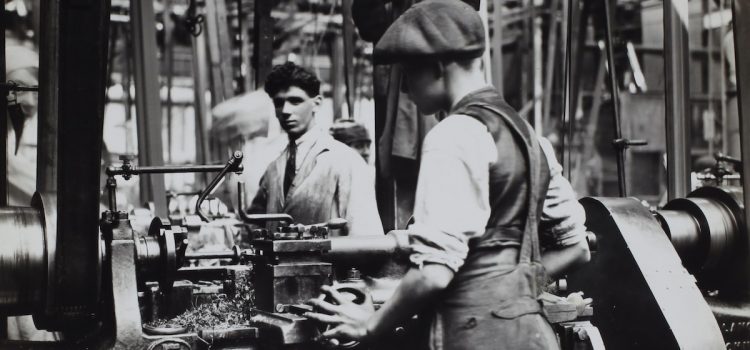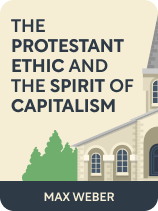

This article is an excerpt from the Shortform book guide to "The Protestant Ethic and the Spirit of Capitalism" by Max Weber. Shortform has the world's best summaries and analyses of books you should be reading.
Like this article? Sign up for a free trial here.
What’s Max Weber’s theory about the origins of capitalism? How does it compare to Karl Marx’s theory?
According to Max Weber, capitalism became a global economy because of the work ethic of Protestants in America and western Europe. This is the argument he presents in his classic work The Protestant Ethic and the Spirit of Capitalism.
Keep reading to learn more about Weber’s theory about the rise of capitalism.
Weber’s Question: Why Are Protestants Distinctly Prosperous?
Writing from Germany at the turn of the 20th century, Weber observes that, in western Europe and America, most business owners and skilled workers were Protestants. While this effect wasn’t universal, it was prominent amongst Protestants in the Netherlands, England, and the United States, and to a lesser extent in Germany and France. In contrast, Weber says, Catholics were often less focused on financial success and were less prosperous overall.
(Shortform note: Weber originally published The Protestant Ethic in two parts. Part 1 was published prior to his landmark 1904 trip to the United States, whereas Part 2 was published afterward. Scholars generally agree that Weber’s trip influenced his thought in major ways, so it’s likely that his emphasis on American Protestantism is no accident.)
According to Weber, capitalism’s origins must be examined in the context of Protestantism since most wealth in America and western Europe belonged to Protestants. Upon his observation, Weber asks whether and to what extent Protestantism contributed to the development of capitalism. He argues that, if Protestants make good capitalists today, something about their beliefs and way of life must be conducive to capitalism. To understand this, we must look at the history of Protestantism and capitalism to see how they relate.
| Weber’s New Sociological Methods Since sociology wasn’t yet an established field at Weber’s time, he had to pioneer techniques for his work. Two key concepts he created are “objective possibility” and “adequate causation.” He used these concepts to explain how he reasoned out causal explanations that were logically plausible (the former term) and likely enough to be true (the latter term). The idea is that in the social sciences, it’s difficult to find clear cause-and-effect explanations for complex phenomena such as the onset of capitalism—so Weber created criteria that enabled him to find answers that were good enough. “Objective possibility” allowed him to argue for the plausibility of a phenomenon such as the Protestant ethic, which isn’t observable in the way that gravity or ocean currents are. “Adequate causation” allowed him to make a reasonable enough argument for such a phenomenon without having exact, precise evidence for it. |
Weber’s Answer: Protestantism Is Conducive to Commercial Success
While Weber’s answer to this problem is complex, he essentially asserts that, yes, Protestantism did influence the rise of capitalism. Specifically, the Protestant ethic, or way of life, shaped the capitalist lifestyle that prevailed by the 19th and 20th centuries. He explains each of these two concepts as follows:
- The Protestant ethic was how early Protestants conducted their lives in the late 1500s through the 1700s (following the Protestant Reformation). Weber argues that specific Protestant beliefs created a unique way of life—a rational, ascetic lifestyle that broke with the traditional lifestyle of subsistence farming and relaxed living.
- The spirit of capitalism is the money-focused way of life that’s characteristic of modern capitalism. It involves rigorous saving and investing, frugality, and a systematic daily routine. All of these habits, and the beliefs that motivate them, help you succeed as an entrepreneur or middle-class person in a capitalist society.
Weber argues that the former influenced the latter on two levels. First, Protestant beliefs and morality influenced capitalist beliefs and morality. Second, the Protestants’ practical lifestyles influenced capitalist habits and lifestyles. Put together, the Protestant ethic contributed its rigorous, systematic, and rational character to the capitalist way of life.
| Weber and Marx on the Origins of Capitalism Weber’s argument was the first to assert that ideas and culture can influence a society’s material and economic development (idealism). This contrasts with Karl Marx’s stance that class struggle shapes the economy and material conditions of life (materialism). At the time, Weber’s view was controversial and sparked great debates. Put roughly, here’s what they each say: Weber: Ideas and culture, such as religious beliefs, can influence how people behave and therefore how economies and societies develop. Protestant religious ideals shaped behaviors and lifestyles conducive to capitalism’s success. Marx: Human history is a history of struggle between the oppressors and the oppressed. The modern economy came about through the bourgeoisie’s violent seizure of land and capital and forcible exploitation of labor. Today, some interpret The Protestant Ethic as a direct refutation of Marx’s argument. However, Weber says that he isn’t trying to deny Marx’s assertions—he just doesn’t think it’s the whole story. Rather, he believes that numerous factors contributed to the onset of capitalism, and that it’s a mistake to attribute it to just one dynamic, as he says Marx does. |
At first, the early Protestants themselves became skillful entrepreneurs and business people. They were the earliest people to embody the spirit of capitalism, though Weber says that they didn’t do so on purpose. Rather, the Protestant way of life was simply well-suited to economic success.
Over time, the religious zealotry that ushered in Protestantism died down. Through the 1700s and 1800s—long past the Reformation’s start in the early 1500s—people gradually became more secularized. But, while they softened their religious zeal, they retained the practical, systematic way of life that began with the early Protestants. This secularized offspring of the Protestant ethic became, in Weber’s view, the modern capitalist lifestyle.

———End of Preview———
Like what you just read? Read the rest of the world's best book summary and analysis of Max Weber's "The Protestant Ethic and the Spirit of Capitalism" at Shortform.
Here's what you'll find in our full The Protestant Ethic and the Spirit of Capitalism summary:
- How the Protestant way of life lead to modern capitalism
- The history of the 16th-century Protestant reformation
- Why the Protestants were so distinctly prosperous






